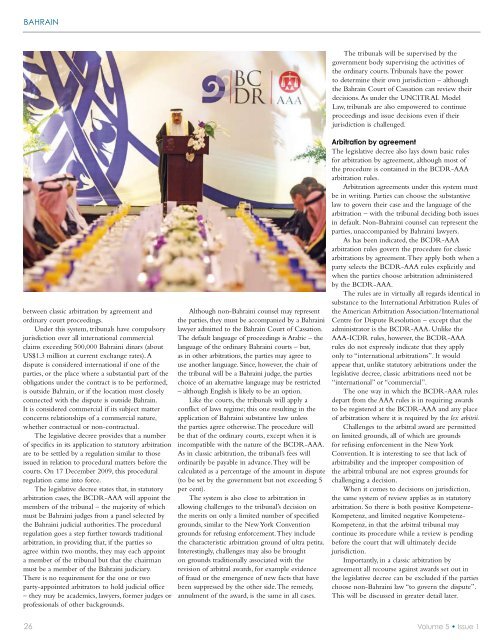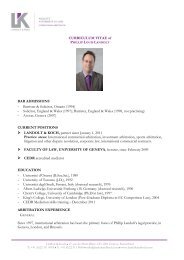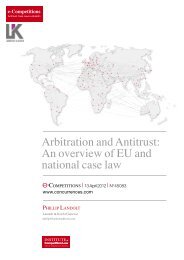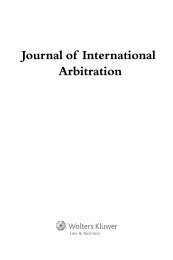Known
View Document - Landolt & Koch
View Document - Landolt & Koch
Create successful ePaper yourself
Turn your PDF publications into a flip-book with our unique Google optimized e-Paper software.
BAHRAIN<br />
between classic arbitration by agreement and<br />
ordinary court proceedings.<br />
Under this system, tribunals have compulsory<br />
jurisdiction over all international commercial<br />
claims exceeding 500,000 Bahraini dinars (about<br />
US$1.3 million at current exchange rates). A<br />
dispute is considered international if one of the<br />
parties, or the place where a substantial part of the<br />
obligations under the contract is to be performed,<br />
is outside Bahrain, or if the location most closely<br />
connected with the dispute is outside Bahrain.<br />
It is considered commercial if its subject matter<br />
concerns relationships of a commercial nature,<br />
whether contractual or non-contractual.<br />
The legislative decree provides that a number<br />
of specifics in its application to statutory arbitration<br />
are to be settled by a regulation similar to those<br />
issued in relation to procedural matters before the<br />
courts. On 17 December 2009, this procedural<br />
regulation came into force.<br />
The legislative decree states that, in statutory<br />
arbitration cases, the BCDR-AAA will appoint the<br />
members of the tribunal – the majority of which<br />
must be Bahraini judges from a panel selected by<br />
the Bahraini judicial authorities. The procedural<br />
regulation goes a step further towards traditional<br />
arbitration, in providing that, if the parties so<br />
agree within two months, they may each appoint<br />
a member of the tribunal but that the chairman<br />
must be a member of the Bahraini judiciary.<br />
There is no requirement for the one or two<br />
party-appointed arbitrators to hold judicial office<br />
– they may be academics, lawyers, former judges or<br />
professionals of other backgrounds.<br />
Although non-Bahraini counsel may represent<br />
the parties, they must be accompanied by a Bahraini<br />
lawyer admitted to the Bahrain Court of Cassation.<br />
The default language of proceedings is Arabic – the<br />
language of the ordinary Bahraini courts – but,<br />
as in other arbitrations, the parties may agree to<br />
use another language. Since, however, the chair of<br />
the tribunal will be a Bahraini judge, the parties<br />
choice of an alternative language may be restricted<br />
– although English is likely to be an option.<br />
Like the courts, the tribunals will apply a<br />
conflict of laws regime; this one resulting in the<br />
application of Bahraini substantive law unless<br />
the parties agree otherwise. The procedure will<br />
be that of the ordinary courts, except when it is<br />
incompatible with the nature of the BCDR-AAA.<br />
As in classic arbitration, the tribunal’s fees will<br />
ordinarily be payable in advance. They will be<br />
calculated as a percentage of the amount in dispute<br />
(to be set by the government but not exceeding 5<br />
per cent).<br />
The system is also close to arbitration in<br />
allowing challenges to the tribunal’s decision on<br />
the merits on only a limited number of specified<br />
grounds, similar to the New York Convention<br />
grounds for refusing enforcement. They include<br />
the characteristic arbitration ground of ultra petita.<br />
Interestingly, challenges may also be brought<br />
on grounds traditionally associated with the<br />
revision of arbitral awards, for example evidence<br />
of fraud or the emergence of new facts that have<br />
been suppressed by the other side. The remedy,<br />
annulment of the award, is the same in all cases.<br />
The tribunals will be supervised by the<br />
government body supervising the activities of<br />
the ordinary courts. Tribunals have the power<br />
to determine their own jurisdiction – although<br />
the Bahrain Court of Cassation can review their<br />
decisions. As under the UNCITRAL Model<br />
Law, tribunals are also empowered to continue<br />
proceedings and issue decisions even if their<br />
jurisdiction is challenged.<br />
Arbitration by agreement<br />
The legislative decree also lays down basic rules<br />
for arbitration by agreement, although most of<br />
the procedure is contained in the BCDR-AAA<br />
arbitration rules.<br />
Arbitration agreements under this system must<br />
be in writing. Parties can choose the substantive<br />
law to govern their case and the language of the<br />
arbitration – with the tribunal deciding both issues<br />
in default. Non-Bahraini counsel can represent the<br />
parties, unaccompanied by Bahraini lawyers.<br />
As has been indicated, the BCDR-AAA<br />
arbitration rules govern the procedure for classic<br />
arbitrations by agreement. They apply both when a<br />
party selects the BCDR-AAA rules explicitly and<br />
when the parties choose arbitration administered<br />
by the BCDR-AAA.<br />
The rules are in virtually all regards identical in<br />
substance to the International Arbitration Rules of<br />
the American Arbitration Association/International<br />
Centre for Dispute Resolution – except that the<br />
administrator is the BCDR-AAA. Unlike the<br />
AAA-ICDR rules, however, the BCDR-AAA<br />
rules do not expressly indicate that they apply<br />
only to “international arbitrations”. It would<br />
appear that, unlike statutory arbitrations under the<br />
legislative decree, classic arbitrations need not be<br />
“international” or “commercial”.<br />
The one way in which the BCDR-AAA rules<br />
depart from the AAA rules is in requiring awards<br />
to be registered at the BCDR-AAA and any place<br />
of arbitration where it is required by the lex arbitrii.<br />
Challenges to the arbitral award are permitted<br />
on limited grounds, all of which are grounds<br />
for refusing enforcement in the New York<br />
Convention. It is interesting to see that lack of<br />
arbitrability and the improper composition of<br />
the arbitral tribunal are not express grounds for<br />
challenging a decision.<br />
When it comes to decisions on jurisdiction,<br />
the same system of review applies as in statutory<br />
arbitration. So there is both positive Kompetenz-<br />
Kompetenz, and limited negative Kompetenz-<br />
Kompetenz, in that the arbitral tribunal may<br />
continue its procedure while a review is pending<br />
before the court that will ultimately decide<br />
jurisdiction.<br />
Importantly, in a classic arbitration by<br />
agreement all recourse against awards set out in<br />
the legislative decree can be excluded if the parties<br />
choose non-Bahraini law “to govern the dispute”.<br />
This will be discussed in greater detail later.<br />
26 Volume 5 • Issue 1





